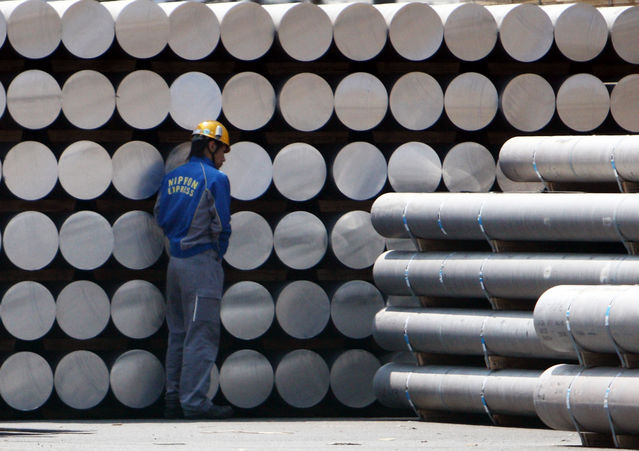Aluminum demand in Japan, Asia’s largest importer, may be flat this year, failing to recover from the lowest level since 2009, as the end of a government subsidy will hurt auto sales, a Showa Denko K.K. (4004) executive said.

Aluminum rods are stacked outside a warehouse shipping terminal in Yokohama City, Kanagawa Prefecture.
Demand will probably stay weak after dropping to 2 million metric tons last fiscal year, said Shunichi Shiraishi, executive officer for the aluminum sector, who is also the chairman of the Japan Aluminium Association. In March, the group forecast demand growth of 2.8 percent for this fiscal year.
Shipments to domestic and overseas markets of rolled- aluminum products expanded 1.1 percent in the first four months, according to the association, as demand from the auto industry was offset by a contraction in sales to electronics makers. Panasonic Corp. (6752) and Sony Corp. (6758) are losing customers amid the yen’s appreciation. The LMEX index lost 2.9 percent this year, while aluminum has dropped 2.2 percent.
“We are struggling to achieve our earnings target for this fiscal year,” Shiraishi said in an interview yesterday. The company forecast a gain 6 billion yen ($75.3 million) in operating profit from aluminum sales of 105 billion yen. “Our industry, as a whole, is in a tough situation.”
Japan’s exports of aluminum products dropped 5.4 percent in the first four months this year as the European crisis curbed shipments of electronics products from China, reducing demand for Japanese components made from the light metal.
Europe, China
“Japanese demand may not grow as much as forecast because of the deepening debt crisis in Europe and a slowdown in China’s economy,” said Takaki Shigemoto, an analyst at research company JSC Corp. in Tokyo. “When the government’s rebuilding stimulus loses effect later this year, manufacturing activity may slow down, curbing consumption.”
Producers of aluminum foil for use in electronics components are reducing output because of a slump in sales to makers of television sets, air conditioners, solar cells and batteries, Shiraishi said. Foil shipments in the first four months tumbled 20 percent from a year earlier, according to the aluminum association.
Japan’s machinery orders increased more than economists expected in April, signaling that reconstruction spending is helping companies cope with the yen’s strength and the euro area’s debt crisis. Aluminum consumption in China, the biggest user, probably has risen more than 10 percent this year and may accelerate in the second half, Jim Lennon, an analyst at Macquarie Group Ltd., said yesterday.
Global Demand
Global aluminum demand will rise as a push in the U.S. and Europe to reduce carbon-dioxide emissions and improve mileage prompts carmakers to increase use of light-weight materials, Erwin Mayr, a senior vice president and chief strategy and commercial officer at Novelis Inc., said yesterday. Novelis supplies more than half of all flat-rolled aluminum products used by the auto industry, according to the company’s website.
Japanese subsidies for purchases of fuel-efficient cars, which contributed to a 66 percent jump in auto sales last month, may expire as early as the end of August, slowing production later this year, according to Satoshi Osanai, economist at Daiwa Institute of Research in Tokyo.
“We can’t think of any industry that can support aluminum demand after consumption by the auto industry loses steam,” Junichi Inaizumi, general manager at Showa Denko’s aluminum sector, said in the same interview in Tokyo.
A surge in the aluminum fee charged by producers for the next quarter will erode the earnings of Japanese fabricators, Inaizumi said. Premiums for the three months starting in July will jump to $200 to $210 a ton over the London Metal Exchange’s price of the metal for immediate delivery, the highest-ever level, from $115 to $127 a ton this quarter.
“The increased costs are hard to pass on to customers completely,” Shiraishi said.
